|
||
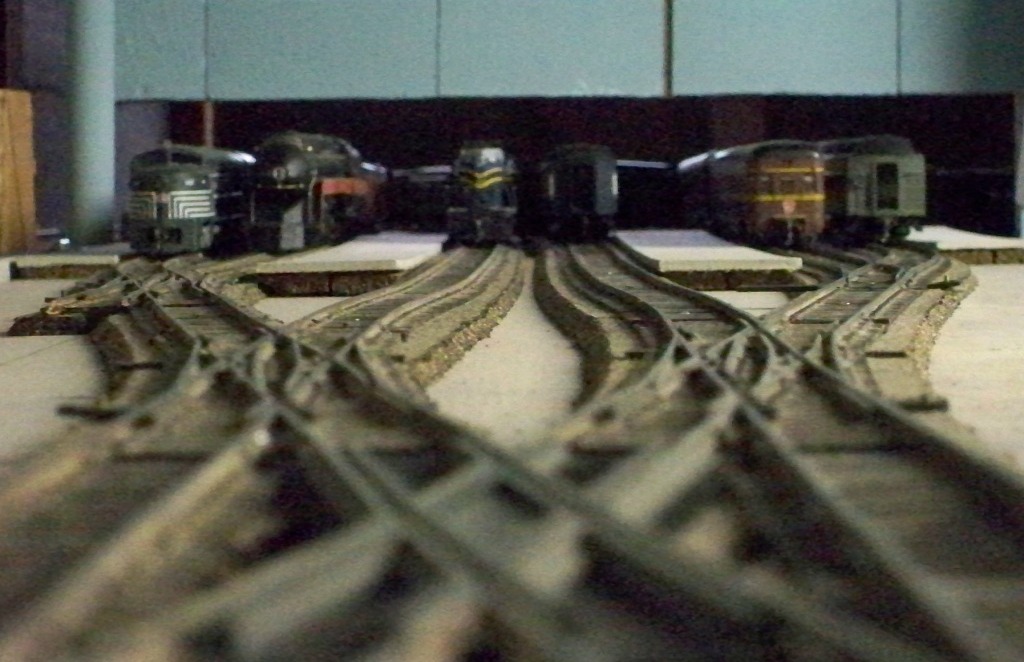 |
◄Loughland Union Station Union Station provides interconnecting passenger and express services via the New York Central, Norfolk & Western, Baltimore & Ohio, and Pennsylvania railroads. From here, the tracks run a short distance east to Colbin, where the
railroads diverge on their separate ways to the Atlantic coast. In
the other direction (behind the camera), a divergence is planned near
the west end of Elbonia yard, but currently all passenger traffic
remains on B&O tracks as far as Haydn Place. |
|
|
Loughland's Union Station has no specific prototype, but is envisioned along the lines of Union Station in Dayton, Ohio, whose tracks are elevated above street level. |
||
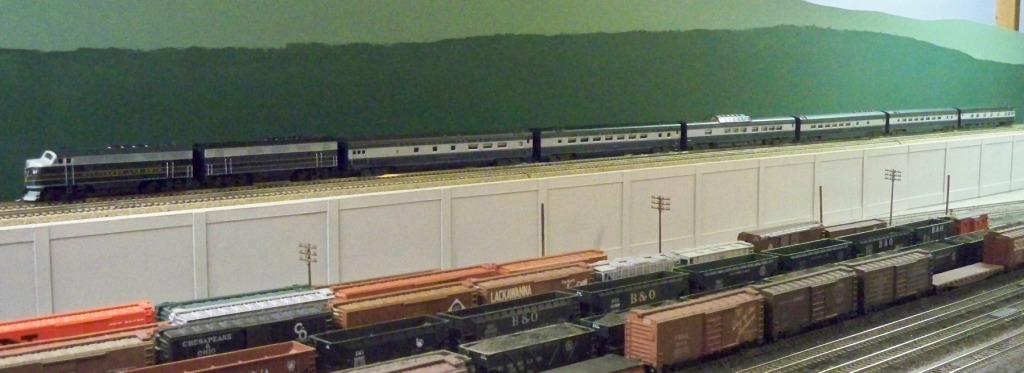 ▲Loughland Viaduct The double-tracked concrete viaduct carries passenger trains to and from Union Station, running parallel to the freight line and yard at ground level. Here the B&O's Columbian accelerates westbound toward Chicago via Pittsburgh.
|
||
Situated south of the viaduct, Elbonia is an industrial district of Loughland. It's the site of B&O's freight classification yard, locomotive roundhouse, and a refrigerator car icing facility, plus local industries.
|
||
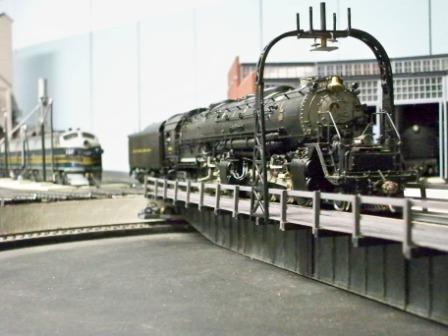 |
◄Elbonia-east engine facility: Incoming EM-1 (2-8-8-4) #7629 clambers onto the turntable to enter the roundhouse for overnight maintenance. At the left, a pair of DF-3's (EMD F3) take on fuel and sand. Except for the occasional breakdown emergency, B&O's Elbonia engine facility services freight power only. |
|
|
S-1a (2-10-2) #6206 pauses at the coaling tower for "topping-off" before backing out to the yard to pick up a freight eastbound for Colbin. A DF-5 (EMD F7) purrs at idle on the diesel service track to the left. Locomotives are routinely serviced on arrival, but fuel and water are topped off before departure. The coaling tower used to serve steam power on three tracks, but now that diesel facilities have been installed on the left, the coaling chutes on the external wall of the tower have been removed. |
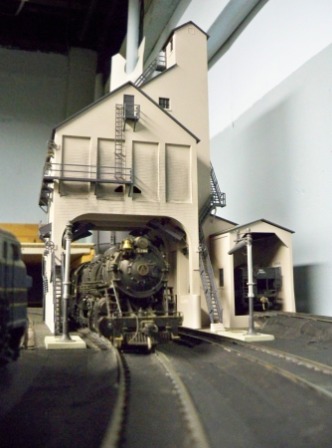 |
|
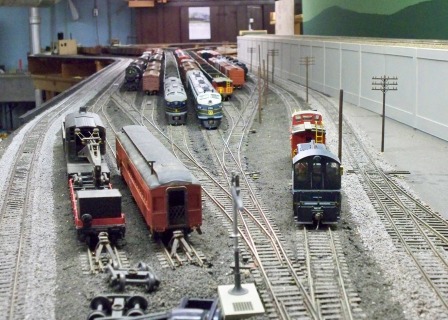 |
It's busy this morning, in this general view of the east end of the yard. Two trains of hoppers—an eastbound with loads and a westbound with empties—have arrived for a change of power and crews. A third, the eastbound "Time-Saver" (center track), has exchanged a few cars for local pick-up and delivery, and is now ready to release brakes and get rolling once more. The yard's DS-11e (EMD NW2) switcher waits on the caboose track for the freight to clear before getting back to its chores. Emergency relief equipment, including a 200-ton crane, is parked on its usual standby siding on the left. Lighter-colored ballast marks the double-track main line, which splits to go around the yard on both sides. |
|
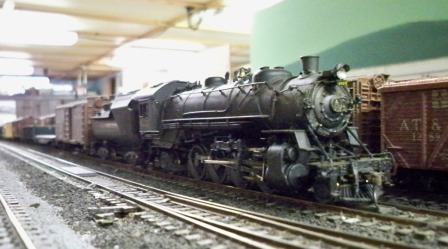 |
Q-4b (2-8-2) #4468 has arrived with the morning eastbound local freight from East Clintwood. The engine will visit the coal and water facilities before being turned to haul the afternoon westbound back up the branch line. |
|
|
●
The largest steam locomotive on my roster (EM-1 articulated #7629), hauling an eastbound freight on the main line, is about to eclipse the smallest (D-30 switcher #1182), standing in the classification yard.
|
||
|
Hopper trains meet—empties westbound to the mines, loads eastbound to the coast—a many-times-a-day sight in the 1950s. No wonder the B&O is nicknamed "the steel conveyor belt"! |
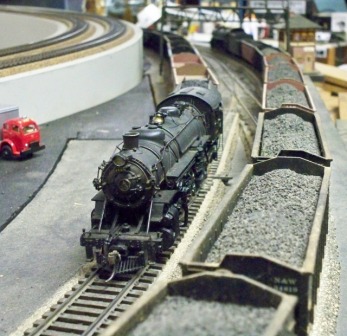 |
|
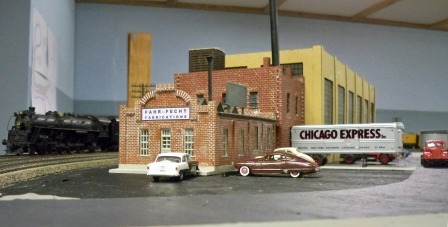 |
◄Elbonia-west: Fahr-Fecht Fabrications The Fahr-Fecht fabricating plant is one of those industries that started small in the early 1900s and expanded during each of the World Wars. A sheen on the pavement and the cinder parking lot suggests there's been a recent rain shower. To the left we glimpse a class T-3 (4-8-2) hustling eastward with a string of loaded refrigerator cars. |
|
 |
◄Elbonia-west: oil depot This bulk oil distributor's main business is motor fuel. Since this is coal country, heating oil hasn't yet caught on with homeowners. The depot is located across the street from the Fahr-Fecht plant, and the same rail siding serves both. |
|
|
Currently in the imagineering stage (hence no pictures), New Bobhart will be located on the north side of the viaduct, cradled in the "elbow" of Elbonia, and adjacent to the interlocking where freight and passenger traffic converge. Although there are no tracks planned for New Bobhart, it serves two purposes. Its aesthetic function is anticipated as a working-class neighborhood, with apartment buildings, retailers, and maybe a park. Its practical function is to keep any derailed rolling stock on the curved portion of the viaduct from falling to the concrete floor. Parts of it will have to remain open, though, to allow standing room for the 1:1-scale building and maintenance crew (me). |
||
|
||
|
Haydn Place depot: |
||
 |
◄Norfolk & Western's westbound Powhatan Arrow, headed by J (4-8-4) #611, brakes for a station stop during an early construction phase at the depot. |
|
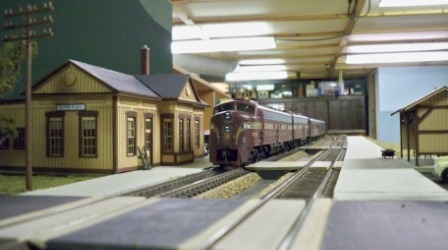 |
◄Some minimal scenery later,
we see the Pennsylvania's
Broadway Limited arriving. The lead unit, #5700, is one
of only a handful of E8's that PRR acquired with the Mars-light option,
likely as EMD demonstrator units. A panoramic view catches all four buildings in the depot ensemble. (Yeah, the prototype crossing shanty looks cockeyed, too!) One of B&O's new passenger-geared RSE-4c's (EMD GP7) charges through with a Pittsburgh-bound mail train.▼ |
|
 |
||
|
Modeler's license: Though there are (in 1955) real-world places (in Ohio and perhaps elsewhere) where the Baltimore and Ohio shares trackage with the Pennsylvania, the New York Central, and the Norfolk and Western, to my knowledge there's no place in the Allegheny region where all four of these railroads operate over the same rails. In the Pittsburgh area, the B&O shares trackage rights with the PRR and the P&LE (part of the NYC System), as well as the Erie. And an N&W branch intersects the B&O at Hagerstown, Maryland, though none of N&W's name passenger trains operate on that branch. Still, this is my railroad, and I'll run whatever I please on it! |
||
|
||
|
More later...
|
||
